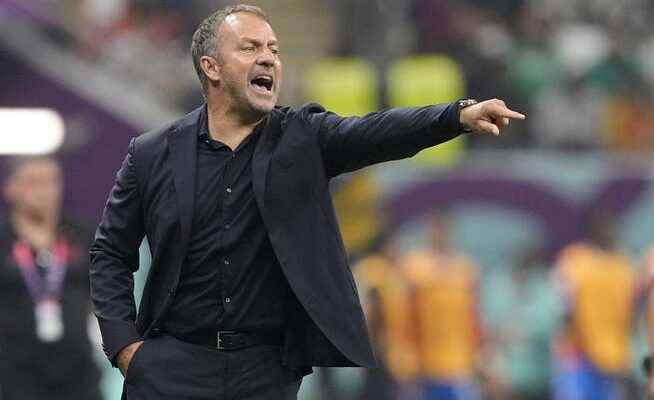For the second time, the German national team fails in a World Cup preliminary round. The association will not be able to avoid a renewal if such results are not to become the rule
Germany national coach Hansi Flick during the match against Costa Rica in Qatar December 1.
When he was eliminated with his team, the German national coach Hansi Flick looked ahead: Now is the time to focus on a new generation of players.
Such a statement seems strange at first glance. Actually, a coach who was greeted with so much goodwill in office – and who missed all expectations with such force – would have been more likely to announce his resignation. Just as Mexico’s coach has done before. But Flick was by no means thinking about it, he had even planned ahead. The day before, he had stated that resigning was out of the question for him. Rather, he is looking forward to the 2024 World Cup.
You can call it chutzpah or delusion that Flick doesn’t think of taking responsibility for the failure in Qatar. Just as Joachim Löw failed to resign after the preliminary round in Russia at the 2018 World Cup, something similar is now announced with Hansi Flick. The DFB lost three years by not completing the separation from Löw. Every day that Flick stays in office is lost.
Flick’s statement that he is now looking at the young generation, at those footballers who can be grouped around the first 19-year-old designer Jamal Musiala, makes something else clear: that he seems to distrust the current generation. Players like Kai Havertz, Serge Gnabry, Leroy Sané and Joshua Kimmich – none of them have yet understood how to convince in the national team. In addition, the coach lacked the guts to make a break, to renew the team and to no longer consider veterans like Thomas Müller.
A lot is in trouble in the DFB. Manager Oliver Bierhoff has been responsible for the national team since 2004. Forever. Bierhoff’s work has long ceased to have a positive effect on the team, and he also doesn’t know how to keep disruptive influences away from the team. The association not only allowed the team to be taken in by the political side, above all by the Minister of the Interior, Nancy Faeser, for her advocacy of the so-called “One Love” armband for the captain. The DFB drove this forward with its permanent slogans of diversity, respect and tolerance. In the hollow drivel about values, the German team was the lone world leader.
Bierhoff admitted that mistakes had been made by the association in dealing with the discussion. But it is the second time that a politically biased debate has eluded him. At the World Cup in Russia, it was the discussion about the contact between midfielder Mesut Özil and Turkish President Erdogan. In terms of craftsmanship, Bierhoff proceeded amateurishly in both cases. Only Bierhoff hardly thinks about leaving his office. Only a renewal is just as impossible with him as with Flick.
When Jürgen Klinsmann took up the position of national coach in 2004, he summed up the state of the institution at the time: Basically, according to Klinsmann, you had to “take the whole place apart”. Nothing more and nothing less would be necessary today. Otherwise, results like the end in Qatar should become the norm.
